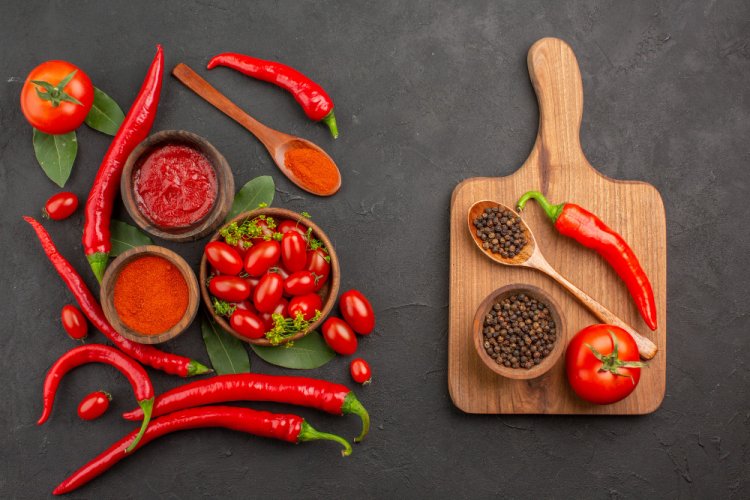Chili Pepper: A Spicy Journey through History, Culinary, and Health
Chili peppers, with their fiery flavor and vibrant colors, have been an integral part of global cuisine and culture for centuries. From adding a kick to dishes to being revered for their medicinal properties, chili peppers have left a significant mark on human history. In this article, we delve into the origins, culinary uses, health benefits, and cultural significance of chili peppers.

Origins and Varieties
Chili peppers, scientifically known as Capsicum, belong to the nightshade family, Solanaceae. They are native to the Americas, with archaeological evidence suggesting their cultivation in Central and South America dating back thousands of years. The exact origins are traced to regions of modern-day Mexico, where wild chili peppers were first domesticated.
Today, there are thousands of chili pepper varieties, varying in size, shape, color, and most importantly, heat level. The heat of a chili pepper is measured on the Scoville scale, named after Wilbur Scoville, who developed the scale in 1912. From the mild bell pepper to the scorching hot Carolina Reaper, there's a chili pepper to suit every palate.
Culinary Uses
Chili peppers are a staple ingredient in cuisines around the world. They add depth, flavor, and heat to dishes, elevating the culinary experience. In Mexican cuisine, chili peppers are essential for dishes like salsa, mole, and enchiladas. Thai cuisine utilizes chili peppers in spicy curries, stir-fries, and dipping sauces. Indian cuisine incorporates chili peppers into aromatic masalas and fiery vindaloos.
Chili peppers can be consumed fresh, dried, powdered, or in the form of sauces and pastes. They are also pickled and fermented to preserve their flavor. The versatility of chili peppers allows chefs and home cooks to experiment with various flavor profiles, creating dishes that range from subtly spicy to inferno-inducing.
Health Benefits
Beyond their culinary appeal, chili peppers offer a plethora of health benefits. The compound responsible for the heat in chili peppers is called capsaicin. Capsaicin has been studied for its analgesic properties, making it a common ingredient in topical pain relief creams and patches. Additionally, capsaicin may aid in weight loss by boosting metabolism and reducing appetite.
Chili peppers are rich in vitamins, particularly vitamin C, and antioxidants, which help combat inflammation and oxidative stress. Studies suggest that regular consumption of chili peppers may lower the risk of cardiovascular disease, improve digestive health, and even have anti-cancer properties.
Cultural Significance
Chili peppers hold significant cultural and symbolic value in many societies. In some cultures, they are associated with fertility and prosperity, often incorporated into rituals and celebrations. In others, chili peppers are a symbol of strength, courage, and resilience, revered for their ability to endure harsh conditions and thrive in diverse environments.
Chili pepper festivals and competitions are held annually around the world, celebrating the diversity and heat of these fiery fruits. From the International Chili Society's World Championship Chili Cookoff in the United States to La Tomatina festival in Spain, where participants engage in a massive tomato fight, chili peppers bring people together in joyous celebration of food and culture.
Conclusion
In conclusion, chili peppers are more than just a spicy condiment; they are a testament to the rich tapestry of human history, culinary ingenuity, and the remarkable benefits of nature's bounty. Whether you crave a subtle heat or a fiery explosion of flavor, there's a chili pepper waiting to tantalize your taste buds and ignite your senses. So, embrace the spice, savor the flavor, and embark on a spicy journey through the world of chili peppers.
#ChiliPeppers #SpicyFood #CapsaicinBenefits #CulinaryDelights #HealthyEating #GlobalCuisine #FoodCulture #PepperVarieties #FlavorfulDishes #CulturalHeritage #FoodFestivals #HeatAndFlavor #SpiceUpYourLife #HealthAndWellness #CookingWithSpices #FieryFlavors #TasteTheHeat #GastronomicJourney #EpicureanAdventures #SensoryExperience
Disclaimer:
The information provided in this article is for educational purposes only and should not be considered medical advice. If you have any health concerns or are experiencing symptoms, it is important to consult with a healthcare professional, such as a doctor or clinic, for proper diagnosis and treatment. Always seek the advice of your doctor or other qualified health provider with any questions you may have regarding a medical condition. Do not disregard professional medical advice or delay in seeking it because of something you have read in this article.
What's Your Reaction?





















